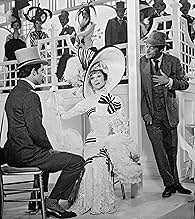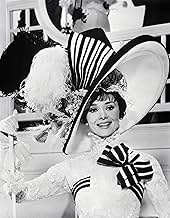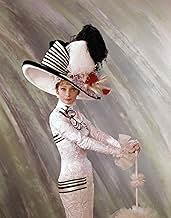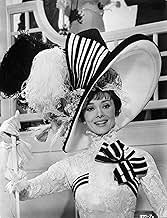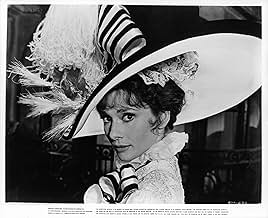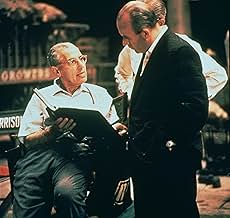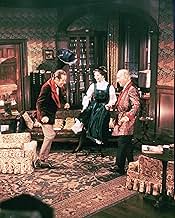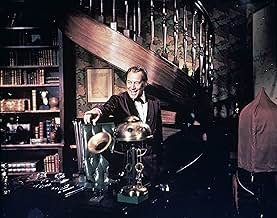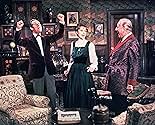Der Snobbish Phonetiker Professor Henry Higgins (Sir Rex Harrison) stimmt einer Wette zu, dass er das Blumenmädchen Eliza Doolittle (Audrey Hepburn) in der High Society präsentieren kann.Der Snobbish Phonetiker Professor Henry Higgins (Sir Rex Harrison) stimmt einer Wette zu, dass er das Blumenmädchen Eliza Doolittle (Audrey Hepburn) in der High Society präsentieren kann.Der Snobbish Phonetiker Professor Henry Higgins (Sir Rex Harrison) stimmt einer Wette zu, dass er das Blumenmädchen Eliza Doolittle (Audrey Hepburn) in der High Society präsentieren kann.
- 8 Oscars gewonnen
- 26 Gewinne & 13 Nominierungen insgesamt
Elizabeth Aimers
- Cockney
- (Nicht genannt)
Helen Albrecht
- Ascot Extra
- (Nicht genannt)
John Alderson
- Jamie - Doolittle's crony
- (Nicht genannt)
Mary Alexander
- Cockney
- (Nicht genannt)
Gertrude Astor
- Cockney
- (Nicht genannt)
LaWana Backer
- Ad Lib at Church
- (Nicht genannt)
Walter Bacon
- Ball Guest
- (Nicht genannt)
Best Picture Winners by Year
Best Picture Winners by Year
See the complete list of Best Picture winners. For fun, use the "sort order" function to rank by IMDb rating and other criteria.
Handlung
WUSSTEST DU SCHON:
- WissenswertesCostume designer Cecil Beaton created 1,500 costumes for this movie, with the exception of the pearl white gown Hepburn wears to the Embassy Ball, an original Edwardian specimen Beaton found in an antique shop.
- PatzerWhen Prof. Higgins sings "An Ordinary Man" he turns on several phonographs, seconds later he turns off one of them but all of the sounds stop.
- Zitate
Eliza Doolittle: The difference between a lady and a flower girl is not how she behaves, but how she is treated.
- Crazy CreditsIn the posters, playbills and the original cast album for the stage version of "My Fair Lady", the credits always read "based on Bernard Shaw's 'Pygmalion' ", letting the audience know what play "My Fair Lady" was actually adapted from. The movie credits simply read "from a play by Bernard Shaw".
- Alternative VersionenIn the remastered version of the film, some of the scene changes are changed from sudden cuts to wipe outs, as they probably were when the film was released. When CBS Fox released it on video originally, they were changed to sudden cuts.
- VerbindungenFeatured in Toast of the Town: Folge #18.17 (1965)
- SoundtracksWhy Can't the English?
(1956) (uncredited)
Music by Frederick Loewe
Lyrics by Alan Jay Lerner
Performed by Rex Harrison, Wilfrid Hyde-White, and Audrey Hepburn
Ausgewählte Rezension
Marni Nixon's singing in both THE KING AND I and WEST SIDE STORY sounded purer to me than did her work in MY FAIR LADY; I thought this was fine, but somewhat thinner and less rich (the voice may well have thinned a little by then). It's lovely to hear Hepburn in "Just You Wait," as it comes as something of a surprise if you had thought all of her singing was dubbed, as I once had. The dubbing and acting do seem to come to a perfect luminous moment at least once: at the end of "I Could Have Danced All Night" it seems as if Audrey Hepburn is really singing it and gives the impression that possibly no one else ever had. It is possible that the best result might have been to let some of the other simpler songs, like "Wouldn't It Be Loverly" be done by Hepburn, and leave those obviously requiring a more technically accomplished singer to Nixon.
It is interesting that Hepburn's "Moon River" is not included on the old soundtrack of BREAKFAST AT TIFFANY'S. Similarly, I went to her memorial service at the 5th Avenue Presbyterian Church here in New York in 1993, and, uncannily, the entire program was listed EXCEPT that... all of a sudden they played her "Moon River" and the whole church became very emotionally charged. I think we were grateful that this let us experience our grief directly by forcing something immediate (but not cruel) on us like that.
I have always been glad anyway that Hepburn did the part and it is certainly the only real reason the film still has life--the controversy about her getting the part may have as much to do with that "life" as anything: it would be a mere artifact, a duplicate of the stage production had Julie Andrews been chosen. Andrews still seems primarily a stage star despite all the movies she made. Most of them are mediocre,a few of them quite good even if I haven't found them interesting myself: she is perfect in THE SOUND OF MUSIC, but the phenomenal appeal of this film is based on something considerably less sharp than what made the earlier Rodgers and Hammerstein masterpieces great-- even when they weren't quite as lavishly produced. Clearly, for example, the score of SOUTH PACIFIC is light-years beyond that of THE SOUND OF MUSIC. Admittedly, Andrews's singing of the score is better than Mary Martin's was. And the voice you can still hear on the Broadway and London cast recordings of MY FAIR LADY is far more complex and rare than Nixon's is.
Still, she wouldn't have made the film unique: while it may or may not be a great film, it has managed to retain a one-of-a-kind quality, and is kept from being a mere facsimile.
It is certainly true that Ms. Nixon should have been credited for her work, whatever our other reservations are. I nevertheless think that some of the lighter opera voices of the time--maybe Anna Moffo or Mirella Freni--would have been better (I don't think Ms. Nixon was "too fine," but rather not quite as good here as she once had been.) Dubbing doesn't have to "match" all that perfectly; of course, certain examples--like Giorgio Tozzi for Rossano Brazzi as Emile de Becque do seem perfect. And if the case of MEETING VENUS is somewhat different, no one ever would dream of worrying about Kiri TeKanawa's voice not matching Glenn Close (Ms.Close unfortunately let us hear her real one doing Wagner on Entertainment Tonight when plugging the film--a harsh and strident moment...)
This is one of quite a number of cases in which the original star was controversially replaced. The strangest may be the rejection of Ethel Merman for GYPSY, although Rosalind Russell was excellent. The smartest may have been Barbra Streisand for Carol Channing for HELLO, DOLLY! She was high-voltage enough for the gargantuan production and her trumpet-like singing was magnificent--a number of us think this is her best film--and it ages fantastically. And, while it is not a matter of replacing a role originated by someone else, Hepburn herself was loudly denounced for BREAKFAST AT TIFFANY'S by Truman Capote; we think of the role as her indelible mark (and surely it is in some ways), but his preference for Marilyn Monroe could have unquestionably led to something extraordinary also--and maybe that idiotic ending that is so hard to overlook would have been replaced by the much more subtle and meaningful one Capote wrote.
It really is Audrey Hepburn who makes MY FAIR LADY continue to "do its work." And in it we may have well seen the most gloriously ripe moment of her incredible beauty.
It is interesting that Hepburn's "Moon River" is not included on the old soundtrack of BREAKFAST AT TIFFANY'S. Similarly, I went to her memorial service at the 5th Avenue Presbyterian Church here in New York in 1993, and, uncannily, the entire program was listed EXCEPT that... all of a sudden they played her "Moon River" and the whole church became very emotionally charged. I think we were grateful that this let us experience our grief directly by forcing something immediate (but not cruel) on us like that.
I have always been glad anyway that Hepburn did the part and it is certainly the only real reason the film still has life--the controversy about her getting the part may have as much to do with that "life" as anything: it would be a mere artifact, a duplicate of the stage production had Julie Andrews been chosen. Andrews still seems primarily a stage star despite all the movies she made. Most of them are mediocre,a few of them quite good even if I haven't found them interesting myself: she is perfect in THE SOUND OF MUSIC, but the phenomenal appeal of this film is based on something considerably less sharp than what made the earlier Rodgers and Hammerstein masterpieces great-- even when they weren't quite as lavishly produced. Clearly, for example, the score of SOUTH PACIFIC is light-years beyond that of THE SOUND OF MUSIC. Admittedly, Andrews's singing of the score is better than Mary Martin's was. And the voice you can still hear on the Broadway and London cast recordings of MY FAIR LADY is far more complex and rare than Nixon's is.
Still, she wouldn't have made the film unique: while it may or may not be a great film, it has managed to retain a one-of-a-kind quality, and is kept from being a mere facsimile.
It is certainly true that Ms. Nixon should have been credited for her work, whatever our other reservations are. I nevertheless think that some of the lighter opera voices of the time--maybe Anna Moffo or Mirella Freni--would have been better (I don't think Ms. Nixon was "too fine," but rather not quite as good here as she once had been.) Dubbing doesn't have to "match" all that perfectly; of course, certain examples--like Giorgio Tozzi for Rossano Brazzi as Emile de Becque do seem perfect. And if the case of MEETING VENUS is somewhat different, no one ever would dream of worrying about Kiri TeKanawa's voice not matching Glenn Close (Ms.Close unfortunately let us hear her real one doing Wagner on Entertainment Tonight when plugging the film--a harsh and strident moment...)
This is one of quite a number of cases in which the original star was controversially replaced. The strangest may be the rejection of Ethel Merman for GYPSY, although Rosalind Russell was excellent. The smartest may have been Barbra Streisand for Carol Channing for HELLO, DOLLY! She was high-voltage enough for the gargantuan production and her trumpet-like singing was magnificent--a number of us think this is her best film--and it ages fantastically. And, while it is not a matter of replacing a role originated by someone else, Hepburn herself was loudly denounced for BREAKFAST AT TIFFANY'S by Truman Capote; we think of the role as her indelible mark (and surely it is in some ways), but his preference for Marilyn Monroe could have unquestionably led to something extraordinary also--and maybe that idiotic ending that is so hard to overlook would have been replaced by the much more subtle and meaningful one Capote wrote.
It really is Audrey Hepburn who makes MY FAIR LADY continue to "do its work." And in it we may have well seen the most gloriously ripe moment of her incredible beauty.
Top-Auswahl
Melde dich zum Bewerten an und greife auf die Watchlist für personalisierte Empfehlungen zu.
Details
- Erscheinungsdatum
- Herkunftsland
- Offizieller Standort
- Sprache
- Auch bekannt als
- Moja draga dama
- Drehorte
- Stage 16, Warner Brothers Burbank Studios - 4000 Warner Boulevard, Burbank, Kalifornien, USA(Ascot & Ballroom scenes)
- Produktionsfirma
- Weitere beteiligte Unternehmen bei IMDbPro anzeigen
Box Office
- Budget
- 17.000.000 $ (geschätzt)
- Bruttoertrag in den USA und Kanada
- 72.560.711 $
- Eröffnungswochenende in den USA und in Kanada
- 354.764 $
- 17. Feb. 2019
- Weltweiter Bruttoertrag
- 72.684.726 $
- Laufzeit2 Stunden 50 Minuten
- Farbe
- Sound-Mix
- Seitenverhältnis
- 2.20 : 1
Zu dieser Seite beitragen
Bearbeitung vorschlagen oder fehlenden Inhalt hinzufügen








